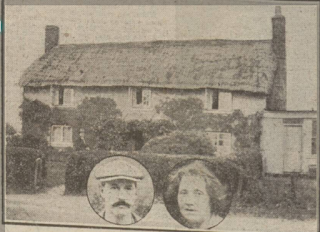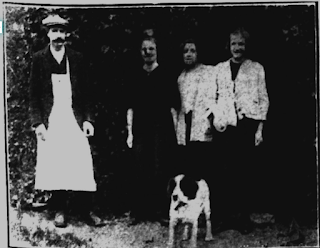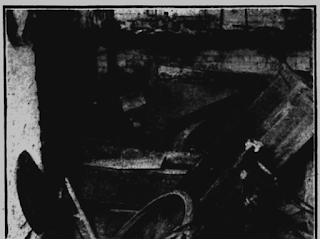Ghost House
Mystery in a village
Uncanny antics of tables and chairs.
Baffled policeman.
Bricks fall when his back was turned.
From “The Daily Chronicle” Special Correspondent.
Finchampstead (Berkshire), Wednesday.
So mysterious have been the happenings in the thatched cottage of Mr George Goswell, the village carpenter of Finchampstead, that a report was today telephoned to Berkshire police headquarters by the village constable, who has spent the whole day inspecting the cottage.
P.C. David Grigg, who has been stationed at Finchampstead for 13 years, had heard the village tales of the weird happenings in Mr Goswell’s home, and so, at 10 am today, he presented himself there to try and solve the mystery. By 9 pm he had heard so much and seen so much that his brow was knit in perplexity, and he candidly admitted to me that he was “licked.”
The cottage is called “The Forge,” and Mr Goswell lives there with his wife and his two daughters – Marjorie, aged 16, and Nellie, aged 14. Nothing happened for years to disturb the peace of their rural household until a wekk ago, when things began to move – in more senses than one.
It all began, so they explained to me this evening, when a big bath full of tins, for no apparent reason, turned right over and scattered its contents on the floor. Since then nearly every piece of furniture and household utensil has been misbehaving itself. Chairs have turned somersaults, pictures have dropped from the walls, and a bicycle and a perambulator insist on falling over.
When I called at the cottage this evening I found P.C. Grigg, in mufti, baffled but not beaten, ruminating over the day’s events. “It’s queer,” he said, “very queer. I should never have believed it, but things happen here which cannot be accounted for. I rang up my superintendent, and told him about it. He laughed, and told me to see a doctor.” Mr Grigg smiled in the quiet, knowing way of a man who has seen things for himself. “I should have said the same myself,” he admitted.
From the pocket of his Norfolk jacket the constable produced his note-book, and read to me extracts from his detailed report on the day’s phenomena. “At 10.10,” began the constable, who had carefully timed every incident, “the bagatelle table in the workshop was leaning against the wall. I was standing just outside the workshop, when I heard a slight noise. I looked in, and found that it had changed its position, and was leaning against the bench.” After that the mysteries came thick and fast, and it was easy to believe that Mr Grigg had had a hectic day. It seemed that he had spent most of his time dashing from room to room, no sooner replacing one object than another would fall with a crash.
A reading desk fell over in the hall but a few yards away from the constable, who “hopped in in two seconds,” and satisfied himself that no one could be there. The door of the workshop locked itself. A trunk in the scullery “turned three somersaults,” a basketful of dirty clothes turned itself upside down, a fender fell down – and so it went on. Nothing puzzled Mr Grigg more than the mystery of the four bricks that fell out of the staircase wall. When the first brick fell the constable went back and wedged it in tight. No sooner did he go away than out fell another. “I knew another brick would fall out,” said Mr Grigg, “so I stood and watched. I stood there five minutes, but nothing happened. Then I knew that as long as I was looking it wouldn’t fall out, so I went round the corner and waited. Immediately I heard the mortar falling, and down came another brick.”
Just as the constable was going home for tea the trunk that turns somersaults started its antics again. Mr Grigg’s diary closes at 6.38 with an entry about the perambulator crashing to the ground, when he was in the sitting room.
Nothing can shake the constable’s conviction that there is no ordinary explanation of these occurrences, and I left him preparing plans for making another effort to solve the mystery tomorrow. “I don’t know what to think,” he declared, “it seems as though there must be something super-normal in it all.”
“Yes, I’m licked,” he admitted, but there was a note of determination in his voice when he added, softly, “for the present.”
London Daily Chronicle, 11th February 1926.
Jazz furniture.
Mysterious events in a cottage.
From a special correspondent.
Wokingham, Wednesday.
Uncanny happenings are reported to be taking place in the village of Finchampstead near here, at the house of George Goswell, the village blacksmith. Chairs are said to be jumping about the room, tables turning upside down, boxes emptying themselves of their contents, and pictures falling from their hangings and returning again. Goswell says that queer incidents have been occurring during the past week and have gradually become worse. The family became so alarmed today that the village constable was called in. He firmly avows that he witnessed the furniture’s peculiar antics. He was so surprised that he did not attempt to solve the mystery, but reported the matter to headquarters. Crowds of interested villagers gather outside the house.
Liverpool Daily Post, 11th February 1926.
Jumping Furniture.
Strange Happenings Alarm a Village.
From our own correspondent. Wokingham, Wednesday.
Remarkable phenomena are reported to be taking place in the home of Frederick Goswell, the village blacksmith, of Finchampstead, near Wokingham. Chairs are declared to be jumping about the rooms, pictures falling from the walls and returning to their nails, tables turning upside down, and boxes emptying themselves. Goswell’s family called the village constable, Grigg, to investigate, and he firmly asserts that he saw the mysterious happenings. The villagers are assembled round the house, which they regard with alarm and awe.
Westminster Gazette, 11th February 1926.
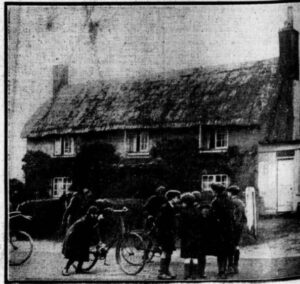
The thatched cottage at Finchampstead, Berkshire, where there have been some mysterious happenings. Chairs have turned somersaults, and a reading desk fell in the hall near the constable called in to investigate.
Newcastle Daily Chronicle, 13th February 1926.
Eerie Happenings in Thatched Cottage.
House of Mystery Where Furniture Jumps About and Trunks Turn Somersaults.
London, Saturday.
Tables, baths, and carpenter’s benches moving and tumbling about, and the dislodging of bricks from the interior walls of a cottage, are some of the mystifying events which have occurred in the small Berkshire village of Finchampstead.
These weird happenings have taken place in the home of Mr and Mrs George Goswell and have caused great consternation amongst the villagers and residents of surrounding hamlets. So frequent did the strange noises and movements of furniture become that the local police constable was called upon. He then despatched a detailed report to the police headquarters at Wokingham and informed his responsible officers as to the result of his long day’s watch on the Finchampstead “House of Mysteries.” Extracts from his book make the most remarkable reading.
In conversation to-day he told me that his watch was commenced at 10 a.m. and continued well into the night. By that time the officer had witnessed so many strange happenings in the house, known as “The Forge,” as to leave him utterly perplexed, and even now he quite candidly admits he is baffled and has no solution to give as to the cause of these mystery movements.
Soon after 10.10 a.m. operations were commenced in the workshops at the rear of the house, and a bagatelle table began to wander around the shop. It had been leaning against the wall, and when the weird noises were heard Grigg took up a position outside the door of the workshop. He decided to be as near the scene of this remarkable disturbance as was possible. In his police report Grigg has written the following note of this incident:-
“Hearing noises, I opened the workshop door, and looking in was surprised to see the bagatelle table had changed its position and was now leaning against another bench. The incident appears to the first of a series.”
The officer’s notes include references to such matters as reading-desk and trunks [fall?]ing over in the hall of the cottage within a yard of where the observant man was standing. He goes on to state that he is satisfied beyond all doubt that no person had been [near?] the place, and that this mystery would [not?] be easily brought to a reasonable and acceptable solution.
The door of the workshop previously referred to is later recorded to have locked itself, whilst a large, heavy box in the [scullery?] is stated to have “turned three somersaults!” A fender fell over, a basket of linen awaiting the weekly washing-day decided to [bo?]lt, and threw the contents over the [floor?], whilst other equally weird doings took a place in the official book, and kept the officer busily engaged for a long day.
Probably the greatest mystery attaches to the falling of several bricks from the wall on one side of the staircase. One brick set the bad example by falling and toppling down the stairs to the feet of the housewife, Mrs Goswell, who had been closely watching developments. Mr Grigg put the brick back into its place, carefully restoring the mortar and very securely fixing the whole wall. He had no sooner got out of the way than he was puzzled to hear mortar falling. The same brick fell out again! Referring to this matter, Grigg states that he had a feeling that another brick would fall out from the wall, and so stood to watch. Nothing happened till he turned his back to give up that watch and [-] away.
“I was just round the corner in the hall when mortar began to fall and down came another brick,” is the extract from the notebook. Matters quietened a little after this, till Grigg decided to leave the cottage in the search for his own home and tea, but before he could reach the road another trunk had commenced antics and turned a somersault in a narrow passageway.
Finchampstead is a small village lying several miles from a railway. It is reached from the “outside world” by an occasional country omnibus or a long devious car ride from Camberley. Mr and Mrs George Goswell’s house is one of the most prominent cottages in the village, with its thatched roof and three-hundred-year old appearance is a picturesque sight.
Mr Goswell was far from keen to discuss matters. He has been troubled a great deal to know what is behind it all, and has been unable to carry on his work as builder and carpenter with his usual free and easy manner. “I cannot explain it [at?] all,” he told me. “It all started about ten days ago, but my wife and myself bothered little at first, thinking some folk might be playing a trick. It kept on each day and night so regularly, never missing a day, that I talked matters over, and then went and asked the police to look into the matters that were causing us great inconvenience and were by then the centre of all village conversations. Since the officer kept his watch for a long day I have heard nothing, although the morning after he left further bricks collapsed and landed in the hall. It is a mystery to which I cannot suggest a solution. I am just befogged.”
Mrs Goswell herself was more inclined to refer to these peculiar incidents. “I am more concerned that our neighbours should realise we are in no fear of impending danger to our own family, and I am sure they will be the last to suffer through any of these things,” said Mrs Goswell. “The villagers seem to think the whole countryside will begin to vanish one afternoon; but, dear me, no, no. I know that there must be something most extraordinary at the root of all this. But what is it?
“My family of youngsters do not get alarmed. My two girls, aged sixteen and fourteen, carry on just the same, and they sleep even better at nights than they ever did in the past. I do hope, however, that the series of mystery happenings is soon to draw to a close, for all our furniture is being badly damaged, and it is not comfortable to sit up of an evening, half wondering what will be next on the list.
“The first thing to tip over was a large bath in which were hoarded a large number of empty tins awaiting disposal. On top I had placed a large piece of heavy woodwork, just for safety, as I thought, but what a noise when the whole collection tipped to the floor. It sounded as if a van load of crockery had been smashed at once. It was too uncanny for words.
“Since then all kinds of things have toppled over, and the local folk have conjured all sorts of weird and wonderful solutions for the cause of this upheaval. To me it is all mystery, and is very, very queer. Even a perambulator and a bicycle have been thrown about the store.”
The haunted cottage and its tenants, Mr and Mrs Goswell.
Sunday Post, 14th February 1926.
Finchampstead Mystery.
Strange movements of furniture in a cottage.
The charming little village of Finchampstead, [which lies in?] a secluded position west of the [??], near Wellington College, has [been brought?] into notoriety as a result of [mysterious?] occurrences in a cottage known as [The Forge] in the occupation of Mr George Goswell, the village wheelwright, his wife and two daughters, Marjorie and Nellie. The cottage [contains?] a smithy and is opposite a post [office? and] a Baptist chapel, and Mr and Mrs Goswell have resided there peaceably for about [??].
About ten days ago, however, the [cottage was?] disturbed by articles of furniture [moving?] in an unaccountable manner, but little [notice was?] taken of the occurrences, which [were considered to?] be due to mere accident. Matters [?] grew worse, and P.c. David [Grigg, who has] been for 13 years the popular [and respected?] representative of the law [-] was called in to make in[vestigations?].
[-] began to be serious when [-] a disused bath, full of empty [- – ] and scattered its contents on [–] awful clatter. Since then [–] have overturned in a most [–]. What is still more puzzling [-] heavy box moved slowly [-] against the wall towards the [- -]. On several occasions a [- -] gradually closed itself up, yet [- – ] with the utmost rapidity [- – ], which were hung on [-] noticed to quiver mysteriously [- -] a picture removed itself [- -] it had been suspended [- -] in a dignified manner on a washstand. In the scullery, a mangle has got into the habit of shifting its position, and an old reading desk, which Mr Goswell brought from the parish church for repair, frequently refuses to stand upright. A perambulator, which is now only used for the cats to sleep in, and is kept in the scullery, has likewise misbehaved itself.
P.c. Grigg has made a careful note of these occurrences, which he has duly reported to Superintendent Goddard, of the Wokingham Police. The Superintendent is rather sceptical, but the constable is mystified. Although he did not actually see the furniture or household articles move, he heard a noise in the workshop in the cottage, and on going to investigate, found that an old bagatelle table had changed its position. Other pieces of furniture upset, while the constable was in the room but when his back was turned. “Very strange indeed” was the only comment P.c. Grigg had to make to a “Reading Standard” representative.
When our representative called at “The Forge” on Thursday morning Mrs Goswell showed him the latest results of the phenomena. About a dozen or more bricks had been removed from the wall separating the drawing room from the staircase, and were scattered about the stairs. This happened that morning while Mrs Goswell was doing her housework, but so accustomed was she to these occurrences that she paid little heed to it. “These things could be explained by someone very clever,” said Mrs Goswell, whose attitude was most sceptical. “I think it is something to do with science. I use my common-sense, and I am not frightened. The only thing I worry about is my children.” She added that she believed the movements were due to electricity, and pointed out that electric light mains had been laid in the vicinity of Finchampstead.
“All these things have happened in the day time, and nothing happens after tea,” proceeded Mrs. Goswell, “except on one night when a picture fell down. I don’t believe in spooks. I always say my prayers every night, and I believe in God, and I don’t think He would send such things to worry people.”
The Rector of Finchampstead (the Rev. E. Corfield) has offered to provide accommodation for the Goswell family at the Rectory, but so certain are Mr and Mrs Goswell that no harm will befall them that they have decided not to avail themselves of the Rector’s kindness.
Mr and Mrs George Goswell and their two daughters, the occupants of the house.
The interior of the workshop in the cottage, showing various articles of furniture which have been mysteriously moved. The bicycle fell over, for no apparent reason, just before the photo was taken.
Photos by C.E. May.
Reading Standard, 13th February 1926.
Bump went bricks!
But P.C. Grigg could not tell why.
Stage illusionists looking for new ideas should pop down to Finchampstead, in Berkshire. There is an idea setting for “The Mystery of the Haunted House,” and the local policeman would no doubt be glad of their services. Here are a few of the mysterious happenings Police Constable David Grigg recorded in his notebook during his investigation work at “The Forge,” a thatched cottage occupied by Mr George Goswell, the village carpenter.
“I was standing just outside the workshop when I heard a slight noise. I looked in and found that a bagatelle table had changed its position and was leaning against the bench.
“A reading-desk fell over in the hall, and no person was found near it.
“A trunk in the scullery turned three somersaults.”
But nothing puzzled Police Constable David Grigg more than the mystery of the four bricks that fell out of the staircase wall. When the first brick fell the constable went back and wedged it in tight. No sooner did he go away than out fell another. “I knew another brick would fall out, ” said Mr Grigg, “so I stood and watched. I stood there five minutes, but nothing happened. Then I knew that as long as I was looking it wouldn’t fall out, so I went round the corner and waited. Immediately I heard the mortar falling, and down came another brick.” Grigg had undertaken to attempt to solve the mystery because he had heard the village tales of weird happenings at “The Forge.”
The People, 14th February 1926.
Jazzing Furniture.
Psychic investigators spend day in the cottage of mystery.
Mysterious happenings in the house of George Goswell, at Finchhampstead, where furniture is continually jumping about and bricks falling from walls for no apparent reason, were inquired into during the week-end by a party of psychic investigators. The party stayed at the cottage all day, and left without giving the result of their inquiries. The furniture continues to tumble about.
Daily Mirror, 16th February 1926.
The Finchampstead Mystery.
Since the publication of the details concerning the mysterious movements of furniture and other articles at a cottage known as “The Forge,” Finchampstead, many visitors from all parts of the country have resorted to the peaceful little village of Finchampstead, either on an expedition of casual sight-seeing or for serious investigation. Mr and Mrs Geo. Goswell, the occupants of the cottage, have been overwhelmed by inquirers, whom, in consideration of her lucid description of what has taken place in her home during the last week or two, Mrs Goswell asks small donations for her missionary box. Meanwhile the furniture still continues to move about in an unaccountable manner, and even the brass knobs on a bedstead have, it is said, got into the habit of unscrewing themselves from their positions. Mrs Goswell is sceptical of the suggestion that the movements are caused by earthbound spirits, but can give no reason why her furniture, and even the bricks of the wall, should shift their positions. There is, however, some prospect that an Oxford University Professor, who is closely identified with psychical research, will make investigations at the cottage, and the result of these will, no doubt, be awaited with interest.
Reading Standard, 20th February 1926
The Finchampstead Mystery.
Much interest has been aroused in the theory of Dr. Schiller, a well-known authority on psychic research, that the mysterious movements of furniture at a Finchampstead cottage were due to a poltergeist, i.e. a spirit that makes a nuisance of itself. This theory recalls a series of incidents, similar to those at Finchampstead, which occurred many years ago in the Devonshire village of Sampford Peverill. In this case numerous articles of furniture in a certain cottage were flung about in a certain cottage were flung about in an unaccountable manner, and women were violently beaten by invisible hands. The vicar of the parish became interested in the case and satisfied himself that the “manifestations” were not due to trickery on the part of the occupants of the cottage, and offered £100 reward for a solution of the mystery. An exciseman and two other villagers volunteered to keep watch in the bedroom where the disturbances had principally occurred. In the middle of the night they heard footsteps climb the stairs and enter the room. Then a woman who was asleep was violently beaten. The watchers brought a light into the room but no intruder could be found. The trouble have long ceased now, but the cottage in question is still the chief object of interest in Sampford Peverill, just as the cottage at Finchampstead will undoubtedly be a source of attraction to visitors to that village.
Reading Standard, 27th March 1926.
Part of the village disappears.
The Thatched Cottage Stores, Finchampstead, which has served the population of the village for 45 years since it was opened by Mrs M. Goswell, is no more. On Saturday afternoon, more than 100 of the villagers went to the store, where presentations were made to the last owners of the shop, who have now retired. They were Miss Marjory Goswell, and her brother-in-law and sister, Mr Graystone Bird and his wife, Nellie. Miss Goswell took over the shop in 1950, when her mother died, and Mr and Mrs Bird came soon after to assist her. Miss Goswell – now 64 – and her younger sister, Nellie, now 62, were born in the village.
Oldest of the trio is Mr Bird, who is 70. At one time, from 1954 to 1961, he was picture editor of the Wokingham Times. For many years he was connected with Wokingham Football Club on the administrative side and has only recently retired because of ill-health. He gave many years of service to the club and still follows their fortunes every Saturday. At home games he is always to be seen in the stand just above the players entrance.
They have given up the store partly because of age, partly because “small businesses are not paying.” Said Mr Bird: “The margin of profit is so low.”
On behalf of the villagers, Sir Conrad Corfield, who now aged 80, has been connected with Finchampstead since 1912, when his father came to be the Rector here, made the presentations. There was a cheque for £160, a book containing the names of all the subscribers, and bouquets for the ladies. Mr and Mrs Bird and Miss Goswell will not be leaving the village. They have a cottage adjoining the stores and they will remain there.
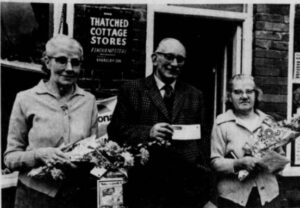
Bracknell Times, 10th January 1974.
A sad loss.
Older residents of Finchampstead will be especially saddened by the loss of Miss Marjorie Goswell, a well-known figure in the village, who died in her sleep on October 30 aged 76. Miss Goswell was born in 1909 in the Greyhound Inn, Finchampstead, which at that time was run by her father. Two years later the family moved to another local landmark, the Thatched Cottage. The Goswell family in Finchampstead goes back to the 1800s.
Bracknell Times, 14th November 1985.
